Summary
Centros de Ayuda para la Mujer Latinoamericana (CAMs) are a network of anti-abortion centers (AACs) across Latin America. The network of CAMs in its current existence first began when Jorge Serrano Limón founded Mexico’s first CAM (essentially, an anti-abortion center, or AAC) in 1989. Serrano was inspired to export the American AAC strategy to Mexico after attending a conference in the U.S. by anti-abortion network Human Life International (HLI). He began to develop the network in Mexico with the support of HLI and its Hispanic arm, Vida Humana Internacional, before expanding the network to include/add AACs in other countries across the region. CAMs now claim to have grown to a network of more than 20 countries across Latin America with over 100 locations.
Through the CAM network, HLI and – more recently – Heartbeat International have essentially taken their predatory U.S.-based AAC strategies and replicated them in Mexico and across Latin America, exporting this hate and harassment across the region. In its current state, the network is a joint operation between these two massive AAC networks, sometimes fine-tuned to the cultural environments and needs of each country, in order to best target pregnant people seeking care, or sometimes just blatantly taking materials from these U.S.-based organizations and translating them, to export this hate most efficiently. While anti-abortion activists in Latin America love to claim that the U.S. is exporting and imposing “gender ideology” through “cultural colonialism,” this is a clear example of how antis are just as happy to take funding, infrastructure, and support from U.S. organizations. It is a clear illustration of just how coordinated the anti-rights movement is globally.
Similar to a shift in the U.S., the growth of CAMs in Mexico (and, more generally, the region) signaled an attempted shift in tactics and image for anti-abortion activists – from aggressive protestors to “caring providers.” However, these organizations are explicitly evangelical Christian in nature, seeking to proselytize and shame pregnant people for seeking out abortion care. CAMs promote an extremist view of abortion, with the hopes of banning it entirely. CAMs set out to “[assist] their affiliates in fulfilling the mission that God has given to reach, rescue, and renew their communities for life by serving abortion-vulnerable women and their families and working to restore God’s plan for our sexuality.”
Extremism
CAMs Peddle Extremist Views On Abortion.
CAMs Push Extremist Ideologies Promoting Banning Abortion Entirely. “La red latinoamericana de Centros de Ayuda para la Mujer es una red sin fines de lucro, comprometida a defender la vida humana desde el momento de la concepción hasta la Muerte natural, de conformidad al Magisterio de la Iglesia Católica Apostólica y Romana.” [CAMs Latinoamericana, accessed 1/5/23]
- “The CAMs network is a non-profit network, committed to defending human life from the moment of conception until natural death, in accordance with the Magisterium of the Apostolic and Roman Catholic Church.”
Like Most AACs, CAMs Push Inaccurate, Unsupported Claims About The So-Called “Effects” of Abortion.
CAMs Push Inaccurate and Unsupported Claims About the So-Called “Effects” Of Abortion – Including “Post-Abortion Syndrome.” “In numerous centers of this network and around the world, our undercover reporters posing as pregnant and vulnerable women were supplied with incorrect medical information – for example, that abortion significantly raises the risks of cancer and mental illness – and were pressured them to continue with pregnancies regardless of their will. … I listened to center staff incorrectly claim that three out of ten women suffer serious complications from abortion, such as perforation of the uterus or intestines and painful deaths (the serious complications from safe abortions are, in fact, extremely rare). The woman who was speaking to me told me, also incorrectly: ‘Do you know that they would not accept you in a hospital when you arrived with a hemorrhage if you self-medicated?’ (By law, public hospitals must treat anyone who comes to an emergency room). [openDemocracy, 2/11/20]
Like Most AACs, CAMs Intentionally Lie to Pregnant People to Delay Their Care, Pushing Them Past Legal Gestational Limits for Abortion.
CAMs Intentionally Tell Pregnant People Wrong Information About Laws Surrounding Pregnancy and Abortion. “Over 50 minutes, the woman mentioned my partner and his ‘right to choose’ to me more than 20 times, even telling me that I would need written consent from him or a family member to get a legal abortion (actually, abortions by the will of the woman are legal in the first 12 weeks of pregnancy in Mexico City).” [openDemocracy, 2/11/20]
CAMs Intentionally Lie to Pregnant People About How Far Along In Pregnancy They Are – Or If They Are Even Pregnant At All. “According to Mexican reproductive rights groups, such false diagnoses by CAMs are routine, with widespread reports of women being shown ultrasound images of fetuses far more advanced than they could possibly be carrying – for example, a woman in her first trimester being shown images from a late-second-term pregnancy—as well as numerous instances of women who were not pregnant being shown an ultrasound of their ‘baby.’ Abortion rights advocates believe that the CAMs are showing prerecorded videos instead of actual ultrasounds.” [Rewire, 9/5/13]
Like Most AACs, CAMs Are Not Subject to Medical Licensing, Regulation, or Transparency Laws.
CAMs, Like Most AACs, Are Subject to Minimal to No Regulation Since They Are Not Registered Medical Providers. “Legislators from different Latin American countries called for action on these findings. A matter of concern for some is that these centers manage to circumvent the rules that regulate medical advice because they are not required to register as health service providers.” [openDemocracy, 2/11/20]
Despite This, CAMs Pose As Medical Providers Who Provide Abortion, However Are Not Licensed Medical Providers, And Even Use Ultrasound Technology Against the Advice of the WHO. “Despite the Facebook claim ‘medical abortion specialists,’ the place was nothing like a clinic and the person I spoke to admitted, upon my question, that he had no medical training. But even so, they offered me an ultrasound as part of their ‘advice’ against abortion and psychological treatment for ‘post-abortion syndrome’ (refuted by the World Health Organization as wrong and without scientific support.” [openDemocracy, 2/11/20]
Although They Boast About Their Wide Presence And Large Number Of People “Assisted,” CAMs Clinics Are Secretive In Location And Not Transparent About Who They Are. “On its website, it claims to have 70 clinics in Mexico and 130 throughout the rest of Latin America and the Caribbean. The website does not give the names or the addresses of the clinics. The Times identified four of them in Mexico City and three others in the states of Mexico, Sonora and Guerrero. The Sonora clinic had a small sign on the door that said CAM, but none of the others gave any indication of their affiliation.” [LA Times, 10/18/21]
Like Most AACs, CAMs Target And Harass Pregnant People Both In Person and Online.
CAMs Target Pregnant People Online, Weaponizing SEO Against Them, And Posing As Abortion Providers On Their Website Only to Bait-and-Switch Their Clients. “In four Latin American countries, our reporters also found CAM network center that specifically target women seeking abortion information and services online. Some present themselves as pro-abortion groups or even as providers of abortion services. One such center in Ecuador proclaims online: ‘Don’t let your life change. It’s your decision’ – and appears to offer the drug misoprostol for a medication abortion. In Costa Rica, another center advertises itself on a website quieroabortarcr.com while one in Argentina has its mobile phones registered on the website embargainesperado.com” [openDemocracy, 2/11/20]
CAMs Target And Harass Pregnant People As They Are On Their Way to Receive Comprehensive Care. “Mostly, the CAMs approach women as they’re heading into clinics or hospitals. Ever since Mexico City’s decriminalization in 2007, CAMs have been setting up small booths on the walkways into clinics, amid stands vending candy and food for hospital visitors” [Rewire, 9/5/13]
CAMs Harass Pregnant People With Invasive and Offensive Personal Interrogations. “The woman who received me at the second center … almost immediately asked me about my religion and wanted to know: ‘Why don’t you want to have your baby?’” [openDemocracy, 2/11/20]
Heartbeat International and Human Life International Feed U.S. Anti-Abortion Propaganda to CAMs, Which Then Push the Same Material on Pregnant People Across Latin America.
The Anti-Abortion Material CAMs Use Is Just Repurposed Materials From U.S. AACs – A Literal Exportation Of the Same Hate. “It’s no coincidence that the Spanish-language pamphlets that the CAMs hand out bear the exact same pictures of mangled fetuses as the anti-abortion protest signs on the Washington Mall. On the back of one gory leaflet collected by López Uribe’s group Balance, a black-and-white tract with images of dismembered second-trimester fetuses under the caption ‘human trash,’ there is listed, in small type, the name and address of its publisher—in Cincinnati, Ohio. And when Mexican women show up at a CAM, it’s often an American movie they see: a subtitled version of the gruesome anti-abortion classic The Silent Scream.” [Rewire, 9/5/13]
Heartbeat International Skims Money Intended For Donations to Latin America For Internal Use.
Heartbeat International Skims Money From Donations Because They Are A U.S.-Based Organization Exporting Their Hate Abroad. “All financial gifts received designated for our approved ‘alliance’ affiliates will be forwarded to them in a reasonable timeframe (usually upon exceeding $250US). Heartbeat International deducts $30 plus 3% from the transfer, to help defray internal cost for money transfers, currency conversion, clerical costs, bank fees and any processing fees that might be charged. Should any funds be unable to be forwarded – primarily related to the recipient – they may be re-allocated for similar international work.” [Heartbeat International, accessed 1/4/23]
Key Players
Founder
Jorge Serrano Limón
Jorge Serrano Limón founded the first Centro de Ayuda para la Mujer en Mexico City on August 15, 1989. He established the AAC after attending the international conference hosted by noted anti-abortion network Human Life International in 1989. Serrano is also the mind behind the expansion of the network to unite AACs throughout Latin America under the stewardship and financial support of HLI. A right-wing figure, Serrano has been tied to Nazi-sympathizing historians in Mexico. Serrano’s profile lessened in the mid-2000s when his ProVida network was exposed as embezzling government funds intended to support anti-abortion ultrasound equipment were used to buy lingerie, instead.
Human Life International

A Human Life International Conference Inspired The Formation of CAMs and Their Network. “En 1989, siendo Jorge Serrano Limón presidente del Comité Nacional Pro-Vida, A.C., asistió al congreso internacional convocado por Human Life Internacional (HLI) en Nueva Orleans, Estados Unidos, donde conoció a Magaly Llaguno, directora ejecutiva de Vida Humana Internacional, la sección hispana de HLI. … Un mes después del Congreso, Jorge fue invitado a un debate en la radio sobre el aborto, en el que una panelista anti-vida le cuestionó acerca de lo que hacia el Comité Pro-Vida por las mujeres que se están enfrentando a un embarazo inesperado. … se plantearan la posibilidad de abrir inmediatamente un Centro de Ayuda para la Mujer (CAM) en México. Es así como el 15 de Agosto de 1989, el primer CAM abre sus puertas en la Ciudad de México.” [CAMs Latinoamericana, accessed 1/4/23]
- “In 1989, while Jorge Serrano Limón was president of the National Pro-Life Committee, AC, he attended the international congress convened by Human Life International (HLI) in New Orleans, United States, where he met Magaly Llaguno, executive director of Vida Humana Internacional, the Hispanic section of HLI. … A month after the Congress, Jorge was invited to a radio debate on abortion, in which an anti-life panelist questioned him about what the Pro-Life Committee was doing for women facing an unexpected pregnancy. … this made the members of the Pro-Life Committee consider the possibility of immediately opening a Women’s Help Center (CAM) in Mexico. This is how on August 15, 1989, the first CAM opened its doors in Mexico City.”
While It’s Unclear Exactly How Much HLI Has Given to CAMs, HLI Spent Nearly $1 Million in the Region Over Six Years, and HLI’s Logo Is Prominent on the CAMs Website. “HLI says it spent about $920,000 in Central America and the Caribbean in 2008-2014, and more than $230,000 in Latin America in 2015-2017. It’s unclear how much of that money went to the CAM network, but its logo appears prominently on the front page of the CAM website.” [openDemocracy, 2/11/20]
CAMs Latinoamerica Promotes HLI On Its Website.
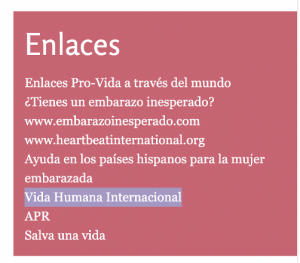
[CAMs Latinoamerica, accessed 1/4/23]
Heartbeat International
CAMs Is Listed As One of Heartbeat International’s Official International Partners On Its Website.
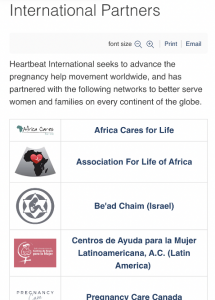
[Heartbeat International, accessed 1/4/23]
Heartbeat International Has Given the CAMs Network At Least $25,000 Since 2012. “Heartbeat has given the CAM network, whose headquarters are in Mexico, at least $25,000 since 2012 for ‘training, consulting and support for our common affiliates,’ according to the group’s tax returns in the US, analyzed by openDemocracy.” [openDemocracy, 2/11/20]
Heartbeat International Vice President Jor-El Godsey Was a Keynote Speaker at the 5th Conference of the Red Latinoamericana Centro de Ayuda para la Mujer (CAMs). “In October, Argentina served as host country for the 5th Conference of the Red Latinoamericana Centro de Ayuda para la Mujer (CAMs), where more than 200 pregnancy help leaders and volunteers from 10 different countries joined together for information and inspiration. The conference featured keynotes by a representative from Human Life International, along with Heartbeat International Vice-President Jor-El Godsey.” [Heartbeat International, accessed 1/4/23]
CAMs Latinoamerica Promotes Heartbeat International On Its Website.
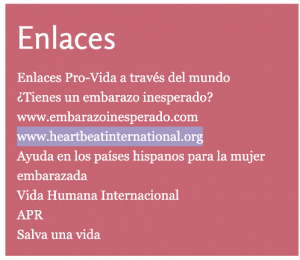
[CAMs Latinoamerica, accessed 1/4/23]
Heartbeat International’s Hotline Is Operational In At Least Bolivia, Likely Elsewhere, Too. “El CAM tiene dos maneras de promocionarse en Bolivia. La primera es a través de su pagina web y ofreciendo servicios de ‘ayuda’ a mujeres. Allí cuentan con una herramienta digital de captación llamada <<Option Line>>, financiada por Heartbeat International.” [Muy Waso, 10/25/22]
- “CAM has two ways of promoting itself in Bolivia. The first is through its website and offering ‘help’ services to women. There they have a digital recruitment tool called ‘Option Line,’ financed by Heartbeat International.”
Operation Rescue
After Mexico City Legalized Abortion Up to 12 Weeks, CAMs Launched a Program Called Operation Rescue – After the U.S.-Based Anti-Abortion Group. “CAM redoubled its efforts in 2007 after Mexico City shocked the rest of the country by legalizing abortion in the first 12 weeks of pregnancy. The group launched a program called Operation Rescue – after the U.S. antiabortion group with the same name – which sent volunteers to hospitals to lure away women who had come for abortions.” [LA Times, 10/18/21]
Influence
The CAMs Network Supposedly Consists of Nearly 100 Locations Across 20 Countries in Latin America.
Over 100 CAMs Exist Across Latin America As Part of the Network. “En la actualidad hay 70 CAM’s en la República Mexicana y 130 en el resto de américa latina” [CAMs Latinoamericana, accessed 1/6/23]
- “Currently there are 70 CAMs in Mexico and 130 in the rest of Latin America.”
Financial
Human Life International’s Financial Reporting Forms Hundreds of Thousands In Grants for CAMs Over Many Years.
Human Life International’s 2020 Form 990 Shows $66,942 In Grants To Latin America – An Undisclosed Amount in Grant Money to Bolivia and Mexico; $17,400 in Grant Money to Ecuador.



[ProPublica, accessed 1/5/23]
Human Life International’s 2019 Form 990 Shows $84,342 In Grants To Latin America — $61,110 in Grant Money to Bolivia; $13,200 in Grant Money to Ecuador; and $6,000 in Grant Money to Mexico.
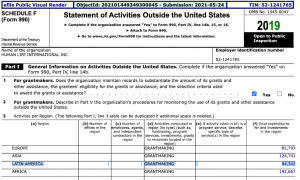


[ProPublica, accessed 1/4/23]
Human Life International’s 2018 Form 990 Shows $63,808 in Grant Money to Bolivia; $13,258 in Grant Money to Ecuador; and $8,100 in Grant Money to Mexico.


[ProPublica, accessed 1/5/23]
Heartbeat International’s Financial Reporting Forms Show Thousands In Spending, And Document the Heartbeat International-CAMs Partnership.
Heartbeat International’s 2019 Form 990 Shows $7,070 in Spending in Mexico.
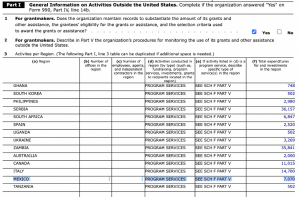
[ProPublica, accessed 1/4/23]
From 2015-2020, Heartbeat International’s Financial Reporting Forms Documented The Official Financial Relationship Between Heartbeat International and CAMs. (the following language was the same each year during this period): “Region: Mexico Heartbeat International has a joint affiliation program with Center de Ayua Para la Mujer Latino Americana, A.C. (CAM). All funds directed to CAM are for training, consultation, and support of our common affiliates. CAM helps us with up-to-date information on pregnancy help ministries in Latin America for our annual worldwide directory.” [ProPublica, accessed 1/5/23]
From 2013-2014, Heartbeat International’s Financial Reporting Forms Documented The Official Financial Relationship Between Heartbeat International and CAMs, Including Travel To and From Each Other. (the following language was the same each year during this period): “Region: Mexico Heartbeat International has a joint affiliation program with Center de Ayua Para la Mujer Latino Americana, A.C. (CAM). All funds directed to CAM are for training, consultation, and support of our common affiliates. CAM helps us with up-to-date information on pregnancy help ministries in Latin America for our annual worldwide directory. In 2013, staff from CAM traveled to Dallas, Texas to attend the Heartbeat Annual Conference for Pregnancy Help Centers. Also, a Heartbeat staff member traveled to the CAM conference in Argentina.” [ProPublica, accessed 1/5/23]
Related Orgs
Heartbeat International
Heartbeat International is a Christian network of anti-abortion centers that seeks to eliminate abortion entirely. Heartbeat International was one of the first anti-abortion center networks in the U.S. and is now one of the world’s largest, with nearly 3,000 affiliates spreading anti-abortion misinformation across all six inhabited continents.
Read MoreHuman Life International
Human Life International (HLI) is a U.S.-based international anti-abortion group that works to harm and imprison women around the world for their reproductive health decisions. HLI has also been accused of violating its non-profit status by participating in election-related activities.
Read MoreOperation Rescue
Operation Rescue is an anti-abortion Christian extremist organization known for its confrontational tactics blockading and harassing abortion clinics, as well as for targeting individual abortion seekers and abortion providers.
Read More